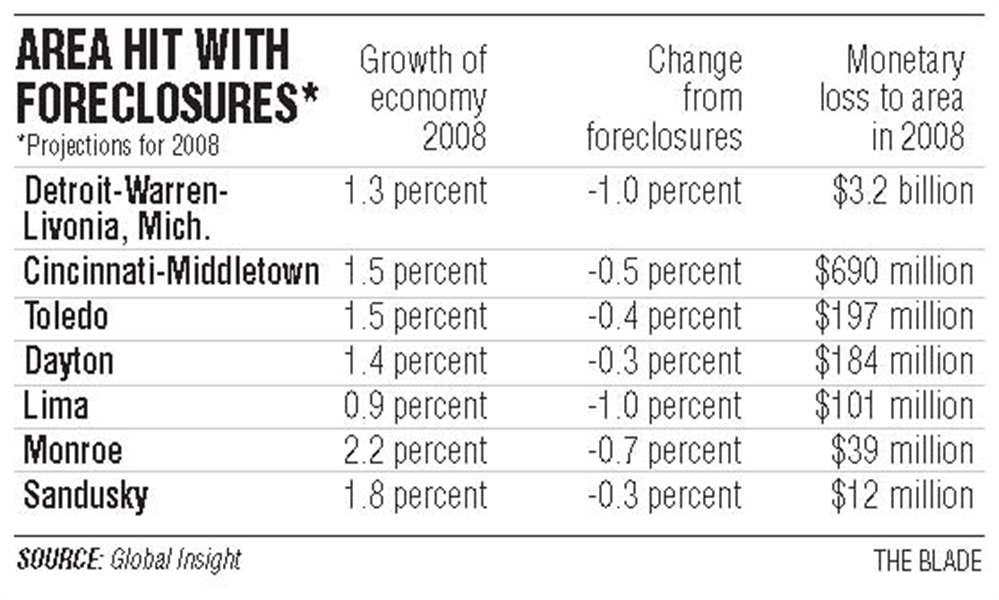
Foreclosures local impact put at nearly $200 million
11/28/2007
Problems rippling from the rise in home foreclosures will result in the loss next year of billions of dollars in communities nationwide, including nearly $200 million in metro Toledo, a new study states.
Lima is expected to lose $101 million, and Sandusky and Monroe will be hurt too, according to the study prepared by Global Insight for the U.S. Conference of Mayors meeting yesterday in Detroit.
Toledo Mayor Carty Finkbeiner was out of town and not at the conference, but Lucas County Treasurer Wade Kapszukiewicz said the foreclosure problem has tightened lending for all types of loans.
On the surface, it might look like the impact will be only on the housing market, but in reality it will affect many areas of the economy, he said.
Lima Mayor David Berger said the problem has affected all spectrums of his metropolitan area.
This is a problem that we have been paying close attention to and interacting with resources at the state and federal level to understand and work on solutions, he said.
The report said the foreclosure issues will lower property values nationally by $1.2 trillion next year and cut tax revenues for municipalities nationwide by more than $6.6 billion. California, the hardest-hit state, will have a $631 billion drop in property value and $3 billion in lost tax revenues.
The delinquent payments from riskier subprime mortgages and escalating foreclosures have shattered residential property values, expanded the number of houses for sale, and reduced state and local tax revenues.

The real estate crisis of 2007 and 2008 will go down in the records book, the Global Insight report said. The wave of foreclosures that has rippled across the U.S. has already battered some of our largest financial institutions, created ghost towns of once vibrant neighborhoods and it s not over yet.
It said reduced consumer spending and lower incomes fueled by the foreclosure crisis will result in the country s gross domestic product, a key measure of the national economy, falling $166 billion, or 1.9 percent, and 524,000 fewer jobs being created next year.
The decline in home construction, the study said, will slide through at least the second quarter of 2008 and sales of existing homes should drop an additional 10 percent next year.
Jeannie Cataldi, an economist for Global Insight of Lexington, Mass., said the broadest factors in the economy were used to calculate the effects on 361 metro areas.
Michigan and Ohio continue to rank among the five worst states with a high number of foreclosures.
Michigan had 43,786 filings through the first nine months of the year, or one per every 102 houses, and Ohio had 46,818, or one per every 107 houses, according to RealtyTrac Inc., a research firm.
Metro Toledo ranked 20th-worst among the nation s 100 biggest cities in foreclosure activity for the third quarter of this year, RealtyTrac said.
Housing price figures dropped in the third quarter in Michigan by 4 percent to $170,800 and in Ohio by 12 percent to $238,400, according to the latest figures from the National Board of Realtors. The price in Toledo was down 7 percent to $107,100, the report said.
The Global Insight study found some metro areas not expected to be hurt, such as Akron, because it didn t experience the housing boom of years past. Metro Cleveland and Columbus also were shown with no ill effects from the foreclosure mess.
Monroe is expected to lose $39 million and Sandusky about $12 million.
The $10.4 billion impact to the economy of New-York-Northern New Jersey area will be the largest loss in the country, followed by Los Angeles-Long Beach-Santa Ana, Calif., with $8 billion, and the $4 billion slowdown in the Dallas-Fort Worth-Arlington, Texas, area.
With a forecasted loss of $3.2 billion, the metro Detroit area will be the No. 7 city in the country in terms of economic loss, according to the study. Michigan, which has had a sharp drop in housing starts in the past three years, will have $111 million less in property taxes and $12 million less in sales taxes next year.